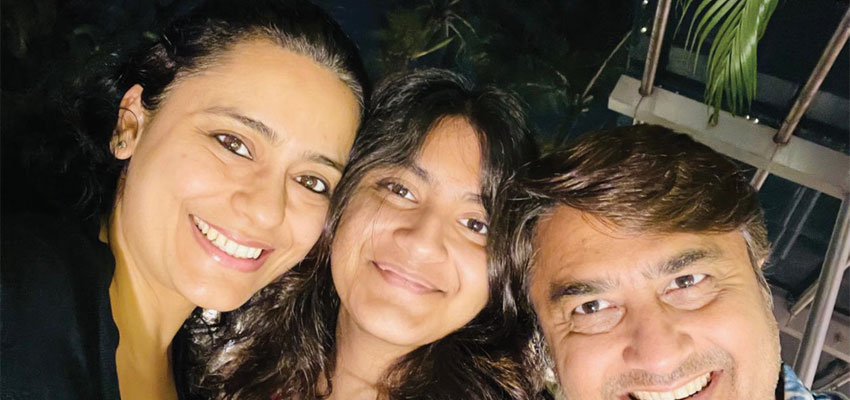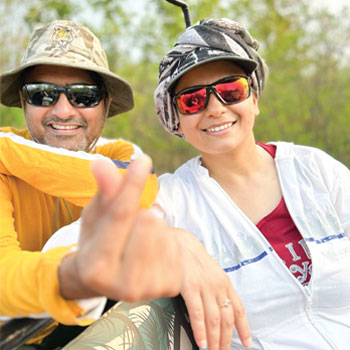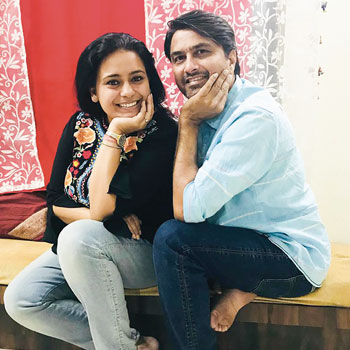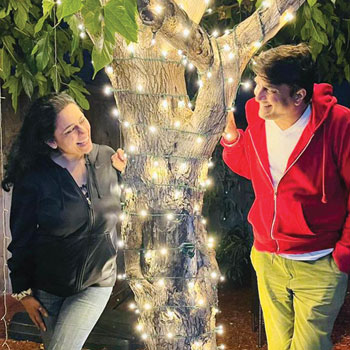Completing life’s jigsaw

She’s a Punjabi brought up in Bihar; he’s the quintessential Marathi mulga. And yet, management professional turned academic co-ordinator Aparna Sachar’s journey with optometric consultant Nilesh Thite, has been about finding companionship in someone with pretty much a similar take on life. Their daughter, 18-year-old Neeharika, completes the circle of love

Nilesh Thite was pursuing his BSc at Pune’s Fergusson College when his buddy told him all about a girl he knew. “She’s my mooh-boli behen,” said the pal. “I think she’s the right match for you,” he assured Nilesh with great confidence.
Bemused, Nilesh simply asked in return, “Since when did you turn matchmaker?”
Turned out though that the friend was right. He clearly knew both of them well.
The friendly and effervescent Aparna Sachar was enrolled at Fergusson College in Pune. A Punjabi kudi born and brought up in Bihar, she had, like many others, come to Pune for her studies.
Both Nilesh and Aparna liked each other from the get-go. Still, the demands of student life meant that their relationship progressed slowly and steadily.
Initially, the duo met in a group. Gradually, they became friends, despite the seeming difference in cultural backgrounds. “We are quite similar, you know,” shares Nilesh. “In the sense that, despite our personalities being seemingly different, we have shared values and principles. For instance, we both prioritise family and integrity in life. Honesty is hugely important to us both. We gel where it really counts, just like the two pieces of a jigsaw,” adds Aparna.
Of course, their personalities couldn’t be more different. “I am an introvert, a man of few words, while she is friendly and outgoing and loves people,” says Nilesh. However, he is also patient and relaxed, the perfect foil to Aparna’s energetic personality. “He is the calm in the chaos I create,” grins Aparna. “When the going gets tough he is the one who says: let’s step back and take a moment to figure this out.
At the same time, his well-timed humour adds that edge of fun to a tense situation.
Nevertheless, given his reserve, it was Aparna who popped the all-important question: Did he see them spending the rest of their lives together?
Surprised but happy, Nilesh, ever the practical one said, “Alright. Let’s give this some time.
The parents had to be convinced. While Aparna’s folks were open to an intercultural match, especially since her dad quite appreciated Nilesh and considered him an honest, straightforward young man, the Thites were a little more orthodox. “They are typically Maharashtrian in their ways and were a little surprised,” says Nilesh. But with time and patience, the families were assured of the duo’s future happiness, and the nuptials went ahead.
From strength to strength
Post-marriage, it has always been a nuclear set-up for Aparna and Nilesh. “My in-laws have never imposed anything on me. Still, I watched and learned,” she says. “Today, I cook both Punjabi and Maharashtrian delicacies well. We celebrate both ways too.”

It helps that Nilesh is easy-going and flexible when it comes to his habits. “If you were to ask him what he would like to eat, his answer, in all probability, would be Dal Chawal. He is that simple,” says Aparna.
Considering they have been married for 20 years, what as per them are the building blocks of a marriage? “Space, freedom, understanding and respect,” spells out Aparna.
On his part, Nilesh adds, “Both partners bring their respective strengths to the table. And, it makes sense to play to those strengths. There are some situations where she takes the lead, and some where I lead,” he says. “That, in essence, is marriage.”
Over the years, both have resolved to minimise conflicts and resolve fights quickly. “I am more reactive and spontaneous while he is patient and cool-headed,” says Aparna. “He stays composed in most situations so that is a good thing.”
“Experience teaches you not to let fights fester,” shares Nilesh. “I mean, the longer the fight lasts, the more time and joy the two of you lose. It’s really not worth it. Far better to make up quickly and get on with things. This is something we have learnt to do deliberately and consciously. Also, once a fight is done, it’s done. It makes no sense to bring up the same issue again."
Both have a simple rule — never to go to bed angry with each other and to start on a clean slate. Quality time consists of outings with their 18-year-old daughter Neeharika— short trips and vacations.
Work-life balance is achievable with their current work profiles. While Aparna, who’s an MBA (HR) has shifted jobs from management to teaching and finally to academic coordinator at a reputed school in Pune, Nilesh too has undergone quite a transit in his niche field of optometry.

Simply put, Optometry is a profession dedicated to checking vision, detecting problems, and prescribing glasses or contact lenses. It is related yet distinct from what ophthalmologists and opticians do—a sort of bridge between the two. Optometrists also help identify eye diseases and refer patients for treatment if needed. They play a key role in keeping our eyesight healthy—a critical service considering 80 per cent of our learning and understanding of the world happens through sight.
While he initially taught at a college and then worked full-time for Bausch + Lomb, he is now a self-employed consultant. “This means, I am the one who is usually home while Aparna and Neeharika are out for long hours. So, I make it a point to receive them both when they are back—we head out for a coffee together, which is family time that we all cherish,” says Nilesh.
Parenting mantras
Neeharika is currently pursuing her BSc in psychology, a demanding but rewarding profession. So, what is the Thite couple’s secret recipe for parenting? While Nilesh is a typical fun dad, Aparna at times has to be the disciplinarian. “Our advice to Neeharika is simple: be happy and love what you do. It’s frankly as simple as that. Also, we believe in transparency and taking all the decisions together,” rounds off Aparna.
MANTRAS OF A MARRIAGE
- Freedom and flexibility
- Mutual respect and acceptance
- Space and understanding
- Prioritising family time